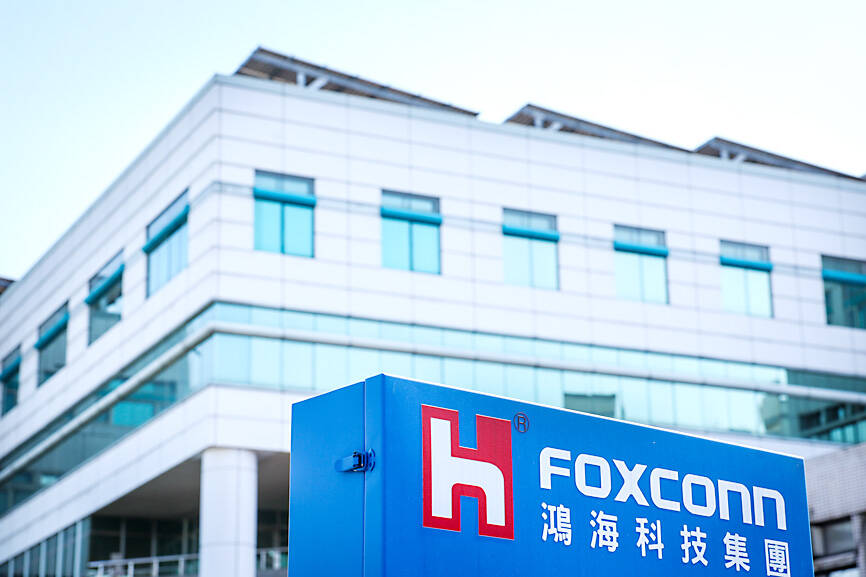Hon Hai Precision Industry Co (鴻海精密), the world’s biggest electronics manufacturer, yesterday said it is expanding production capacity of artificial intelligence (AI) servers based on Nvidia Corp’s Blackwell chips in Taiwan, the US and Mexico to cope with rising demand.
Hon Hai’s new AI-enabled factories are to use Nvidia’s Omnivores platform to create 3D digital twins to plan and simulate automated production lines at a factory in Hsinchu, the company said in a statement.
Nvidia’s Omnivores platform is for developing industrial AI simulation applications and helps bring facilities online faster.

Photo: CNA
Hon Hai’s Mexican facility is to begin production early next year and the Taiwan site is to enter production next month, Nvidia wrote on its blog.
The Mexican facility could deliver significant cost savings and achieve a reduction in kilowatt-hour usage of more than 30 percent annually, it said.
Hon Hai, which ships 40 percent of global servers, said it is the world’s first manufacturer of the Blackwell devices.
The firm said it expects production volume to rise next quarter.
In a separate statement, Hon Hai said it has won best-applicant status in a land development project in Kaohsiung, having invested NT$15.9 billion (US$490.44 million) in conjunction with the Kaohsiung Mass Rapid Transit Bureau.
The investment set a record for joint land development projects with the Kaohsiung City Government.
Hon Hai plans to build a 45-floor office building and a 32-floor residential-commercial complex at the site, which is to house its new southern Taiwan flagship headquarters, the company said, adding that demand for talent is growing along with its expansion in Kaohsiung.
The project is part of Hon Hai’s broader investment plans in the city, it said.
The company last year said it planned to invest NT$25 billion in the city in the following three years, including a software research and development center, an electric bus manufacturing facility, a large advanced AI computing center and a battery manufacturing center.

When an apartment comes up for rent in Germany’s big cities, hundreds of prospective tenants often queue down the street to view it, but the acute shortage of affordable housing is getting scant attention ahead of today’s snap general election. “Housing is one of the main problems for people, but nobody talks about it, nobody takes it seriously,” said Andreas Ibel, president of Build Europe, an association representing housing developers. Migration and the sluggish economy top the list of voters’ concerns, but analysts say housing policy fails to break through as returns on investment take time to register, making the

‘SILVER LINING’: Although the news caused TSMC to fall on the local market, an analyst said that as tariffs are not set to go into effect until April, there is still time for negotiations US President Donald Trump on Tuesday said that he would likely impose tariffs on semiconductor, automobile and pharmaceutical imports of about 25 percent, with an announcement coming as soon as April 2 in a move that would represent a dramatic widening of the US leader’s trade war. “I probably will tell you that on April 2, but it’ll be in the neighborhood of 25 percent,” Trump told reporters at his Mar-a-Lago club when asked about his plan for auto tariffs. Asked about similar levies on pharmaceutical drugs and semiconductors, the president said that “it’ll be 25 percent and higher, and it’ll

CHIP BOOM: Revenue for the semiconductor industry is set to reach US$1 trillion by 2032, opening up opportunities for the chip pacakging and testing company, it said ASE Technology Holding Co (日月光投控), the world’s largest provider of outsourced semiconductor assembly and test (OSAT) services, yesterday launched a new advanced manufacturing facility in Penang, Malaysia, aiming to meet growing demand for emerging technologies such as generative artificial intelligence (AI) applications. The US$300 million facility is a critical step in expanding ASE’s global footprint, offering an alternative for customers from the US, Europe, Japan, South Korea and China to assemble and test chips outside of Taiwan amid efforts to diversify supply chains. The plant, the company’s fifth in Malaysia, is part of a strategic expansion plan that would more than triple

Taiwanese artificial intelligence (AI) server makers are expected to make major investments in Texas in May after US President Donald Trump’s first 100 days in office and amid his rising tariff threats, Taiwan Electrical and Electronic Manufacturers’ Association (TEEMA, 台灣電子電機公會) chairman Richard Lee (李詩欽) said yesterday. The association led a delegation of seven AI server manufacturers to Washington, as well as the US states of California, Texas and New Mexico, to discuss land and tax issues, as Taiwanese firms speed up their production plans in the US with many of them seeing Texas as their top option for investment, Lee said. The